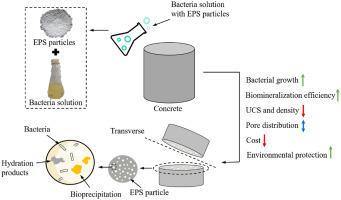Journal of Cleaner Production ( IF 9.7 ) Pub Date : 2022-08-06 , DOI: 10.1016/j.jclepro.2022.133363 Junchen Xiang , Yuying Song , Hang Shu , Zehua Li , Jingping Qiu , Xiaowei Gu

|
At present, microbial-induced carbonate precipitation (MICP) is still difficult to apply to cement and concrete, mainly because bacteria are easily corroded by alkaline cement. However, the carrier commonly used in engineering is expensive and difficult to be obtained. To solve the noted problem, this study reports an economic and environmentally friendly carrier to carry microorganisms, namely waste expanded polystyrene (EPS) particles. This work aims to investigate the potential of EPS particles as a biocarrier applied to the concrete. A series of tests were used tests were used to characterize the biocement samples with EPS particles, and the samples were analyzed for strength, pore distribution, and density. The results show that EPS particles as the carrier can improve the biomineralization by 5.85–17.79% and the pore distribution of concrete. The porosity and self-supporting of EPS can adsorb microorganisms inside or on its surface, thus avoiding the microorganisms from being eroded by highly alkaline concrete. The OD600 value increased by 0.45 when EPS particles are added. Many CaCO3 and hydration products are generated on the surface of EPS particles, which improves bacterial growth and also proves that EPS particles are not mutually exclusive with cement. EPS particles in the samples cured for 28 days are still intact and not decomposed by bacteria. The cost of the EPS carrier is 80% lower than that of the common carrier, such as diatomaceous earth and microcapsules, but the strength of the sample decreases because EPS is a lightweight material. This is of great significance to the utilization of solid waste and the development of biotechnology.
中文翻译:

发泡聚苯乙烯(EPS)颗粒作为载体改善混凝土中微生物的生长
目前,微生物诱导的碳酸盐沉淀(MICP)仍然难以应用于水泥和混凝土,主要是因为细菌容易被碱性水泥腐蚀。然而,工程中常用的载体价格昂贵且难以获得。为了解决上述问题,本研究报告了一种经济且环保的携带微生物的载体,即废发泡聚苯乙烯(EPS)颗粒。这项工作旨在研究 EPS 颗粒作为生物载体应用于混凝土的潜力。使用了一系列测试来表征具有EPS颗粒的生物水泥样品,并分析样品的强度、孔隙分布和密度。结果表明,EPS颗粒作为载体可以提高5.85-17.79%的生物矿化度和混凝土的孔隙分布。EPS的孔隙率和自支撑性可以吸附微生物在其内部或表面,从而避免微生物被强碱性混凝土侵蚀。外径添加 EPS 粒子时, 600值增加 0.45。EPS颗粒表面生成许多CaCO 3和水化产物,促进细菌生长,也证明EPS颗粒与水泥不互斥。固化28天的样品中的EPS颗粒仍然完好无损,没有被细菌分解。EPS载体的成本比硅藻土、微胶囊等普通载体的成本低80%,但由于EPS是轻质材料,样品强度降低。这对固体废物的利用和生物技术的发展具有重要意义。











































 京公网安备 11010802027423号
京公网安备 11010802027423号